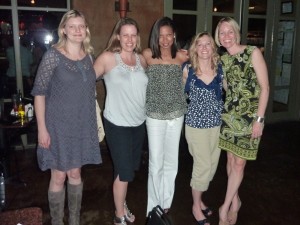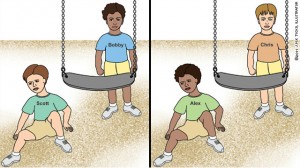Anderson Cooper is highlighting results all week on his CNN AC360 show about kids and race in America. As adults it's sometimes harder to gauge prejudice and racism since we are trained to be politically correct and don't want to perceive ourselves as buying into any negative stereotypes. In kids there is only honesty and a mirroring of what they have been taught at home and school. The word friend came up multiple times in the study and I felt both thrilled at the value our friendships play in integrating our society, but also convicted at how we still seem to all hang out with people who are more like us than not.
Seeing the Lack of Skin Diversity in My Friends
This last weekend I was with a group of my friends from my days when I lived in Southern California-- a very diverse place. And as we kept gathering for group photos I felt a tinge of embarrassment that four out of the five looked alike-- white and blond. How did that happen, I asked myself. Our group wasn't hand selected by any one person-- we just all started coming together seven years ago. We used to have a Latina in our group, but with her dropping out, now it's just one gorgeous black woman and four whites. It made me want to at least dye my hair red or brown...
My defense mechanism went into play as I started naming all my other friends from different places, reminding myself that I know, love, and admire tons of non-white skinned people. Take a picture of me with my local San Francisco friends and it would look very different. And I tried to tell myself that diversity is more than skin color-- I hang out with women of many different socioeconomic levels, various careers, a great range of personalities, different sexual identities, and I pride myself that I build relationships with single women and moms-- two things I am not. But still, it bothers me that of my closest friends, most of them are white.
Unfortunately, I'm not alone in that. As Rachel Bertsche reports in her book MWF Seeking BFF: "In 2004, only 15 percent of Americans reported having at least one confidante of another ethnicity.... Among college students arriving on campus, race and living proximity are the two strongest indicators of who your friends will be."
Study after study keeps highlighting that while we may all self-report more diversity in our network, we still tend to grow closest to those who are most like us, skin color included. One creative study looked at wedding party photos online and assessed that only 3.7% of white brides and grooms have a black person as a bridesmaid or groomsman. Much has been reported about the study that showed that the larger and more diverse a college campus is, the more likely the students sought out people groups just like themselves. When we live in highly diverse areas, we're less likely to actually engage in all in the diversity and instead use the size as an opportunity to find more people like us.
Three Things I Learned on AC 360 Kids on Race Findings
1. Black Kids Are More Racially Optimistic than Whites. In the year-long study sponsored by AC360 kids were shown a picture where it wasn't clear what had happened and then asked questions such as "What's happening in this picture?", "Are these two children friends?" and "Would their parents like it if they were friends?"
Only 38% of black children had a negative interpretation of the pictures, whereas almost double -- a full 70% of white kids -- felt something negative was happening. Melanie Killen, the child psychologist in charge of the study said, "African-American parents ... are very early on preparing their children for the world of diversity and also for the world of potential discrimination," compared to most white parents who tend to avoid the subject and just hope that their kids are color-blind.
It made me super proud of all the black parents who are out there intentionally trying to help their kids integrate, and saddened me that most white parents wouldn't view integration with the same importance or need.
2. There's a Subtle "Limit" for How Close We Should Get With Each Other. While black children start out positive, by age 13 they become as pessimistic as white kids when shown similar pictures. Certainly more experiences of prejudice and an awareness of the racial realities would account for some of the growing pessimism of black children, but they also commented on how parents of both races start to change their tune as the children age. When parenting a 6-year old we want our young kids to play nicely with everyone, but by the time they reach high school we're getting worried about inter-racial dating. In other words-- the message shifts from "play with everyone" to "don't get too close to someone of the opposite race."
Subtly we can be taught to be friendly, but not to become close friends. It's hard to teach equality when we sense that there is a limit to that equality. That we can only accept each other up to a certain point of intimacy--platonic or romantic.
While the racial distrust seems to show up in both white and black teens, other studies like the bridal party study I quoted earlier still seems to suggest that blacks are more likely to report close white friends than the other way around. Nearly 96% of white bride and grooms have all-white wedding parties, whereas black brides and grooms are 22% likely to have a white friend stand up with them.
3. Having a Friend of the Other Color Was Hugely Defining. Enough studies show that we still flock to people like us even in diverse settings, but being surrounded by diversity still raises our perception of people different from us. The white kids who were tested at diverse schools were drastically less negative than the white kids who attended mostly white schools.
"The reason, according to Dr. Killen, is about friendships. 'There's almost nothing as powerful as having a friend of a different racial ethnic background to reduce prejudice, to ... have that experience that enables you to challenge stereotypes,' she said."
The whole subject of race is hard to talk about sometimes. We risk seeing parts of us we'd rather deny and we're scared of saying it wrong or offending each other. And yet, I think it's crucial that we keep holding up the mirror that reminds us to keep widening our circle of comfort and habit.
I'd love to hear some comments from some of you about the studies I've quoted... What strikes you as you read some of their findings? Have you found these results to be reflective of your personal experiences? Do you wish you had more diverse friendships? What makes it hardest, in your opinion, to build these close relationships with people who have a different skin color? What have you learned from your relationships with people from a different culture or race?



